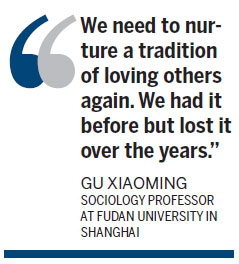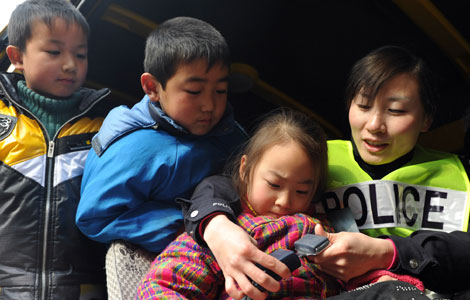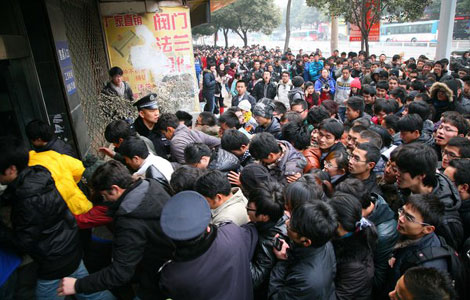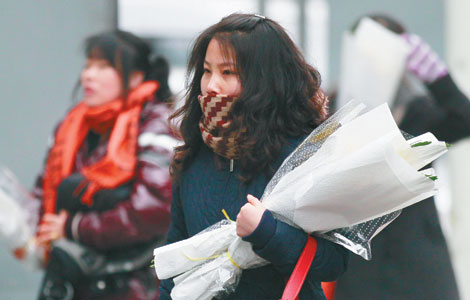|
|||||||||||
What happened to three 2-year-olds across the nation raised questions, and, at the same time, reaffirmed people's willingness to play the Good Samaritan.
SHANGHAI - Three 2-year-old girls experienced drastic changes in their lives in 2011 - incidents that even as they left a big question mark on the apparent lack of concern for fellow human beings in Chinese society, also helped reaffirm people's willingness to do others a good turn.
Xiang Weiyi, nicknamed Yiyi, a Wenzhou girl was the last survivor found in the wreckage of a deadly train accident that claimed 40 lives, including that of her parents. The incident triggered widespread discussion about people who made every effort to save her and also those responsible for the tragic accident.
Zhang Fangyu, nicknamed Niuniu, accidentally fell out a window on the 10th floor of her home in Hangzhou, East China's Zhejiang province, in July. Luckily, a woman passing by caught her in her arms. The rescuer, Wu Juping, who broke her arm in the process, was widely applauded for her courage and concern for a little girl she did not know before.
Another girl, Wang Yue, or nicknamed Yueyue, in Foshan, South China's Guangdong province, might have left a bloody mark on the conscience of the nation.
She was run over by two vehicles in October and ignored by more than a dozen passers-by, even as she lay on the road, injured. She eventually died of brain failure. Her death triggered a nationwide wave of mourning, as the incident had been closely followed by people who were concerned about a seeming lack of moral concern for others in Chinese society.
Even as media analysis of the above incidents tends to overstate the apparent selfishness of the public, these may not be totally isolated cases. Incidents demonstrating a total emotional detachment from a fellow human being's suffering have been reported in recent years - boatmen asking high prices to retrieve drowning bodies, crowds gathering to watch a woman trying to commit suicide by jumping from a building, treating it as a spectacle, to name just a few.
In a country that has more than thousands of years of history of high moral standards, the question as to if one should step forward to help a fellow human being in danger is now a crucial one.
"To help or not to help - it is not only a matter of taking responsibility, but also one of mutual trust and reliance, which are essential to build interpersonal relationships in a society," said Gu Xiaoming, sociology professor at Fudan University in Shanghai.
Gu said currently there was a lack of willingness to take care of and help strangers, as people were not encouraged to do so, due to certain ideas about social behavior strongly-entrenched in people's minds.
At a time of unprecedented opportunities and materialistic impulses, people tend to measure every step they take against the possible material benefits that it might bring them. Plus, one has to cope with the pressure of having to survive a rapid pace of industrialization and urbanization. People tend to be driven by the idea, "everything that is not beneficial to me is none of my business", said Gu.
|
 |
"We need to nurture a tradition of loving others again. We had it before but lost it over the years. Take the Spring Festival, for example. In the past it was a great time for reunion of families and friends, an opportunity to show our love to families, acquaintances and neighbors. But now it is all about shopping, entertainment and commercial activities," said Gu.
Another reason for the decline of willingness to care for others and the slackening of connections between people was some newly-evolved social behavior that discouraged good deeds.
"Just look at the recent reports on two schoolgirls studying in the fourth grade who listed tips on how to fight with their mothers. If parents and kids are thinking of ways to fight each other, there is no wonder why strangers are distant to one another and why people have so many conflicts and disputes. Interpersonal relationships in our society must be re-established," said Gu.
Previous cases of people whose attempts of trying to help landed them in trouble might also be acting as a deterrent. Often people do not come forward to help for fear that they might get framed in the bargain and end up losing money and good reputation.
In 2006, Peng Yu, who was driving in Nanjing, supposedly stopped his car when he saw an old woman fall down on the road and escorted her to a hospital. At least that's his version. But the woman he apparently tried to help accused him of knocking her down with his car, and a court ordered him to pay her 45,000 yuan ($7,140) in damages in 2007.
Later "Case of Peng Yu" became a metaphor for cases in which people trying to help others ended up in trouble. While what truly happened between Peng and the old woman would probably never be known, similar cases were reported across the country over the past years.
Now people think twice before trying to help an elderly person collapsing on the street.
In a survey conducted by Sina.com which polled more than 20,000 Chinese, half of the respondents said they would "indirectly help by calling emergency first aid" if they saw strangers collapsing on the ground while 36.8 percent said they would not act at all, to steer clear of possible trouble.
The trend that fewer and fewer people are willing to help senior citizens falling down on the street is not a matter of declining morality or missing moral legacy, insists Yin Xiaohu, deputy head of the Institute of Law of the Shanghai Academy of Social Sciences.
Whenever the media covered similar cases of senior citizens collapsing on the street, people agreed that help should be extended to those in need, reflecting the fact that society was not totally rid of morality and most people still appreciated the chance to do fellow human beings a good turn, said Yin.
"That people were scared to help, or had second thoughts about doing so was the consequence of the lack of protection for the do-gooder. So our society and the authorities must provide necessary protection and services to people willing to do good," said Yin.
Could Yueyue have met with a better fate if that had happened?
The possible consequences of helping others should not be an excuse for neglecting to do so, some experts argued. To certain people, moral rectitude was about not doing bad things, while stretching a helpful hand to strangers in distress was a different matter altogether, not strictly falling within the ambit of morality.
Sociologist Sun Liping argued in his essays that coldness and numbness to immoral deeds also constituted a minor delinquency, which deserved to be punished.
Measures to restore the social orders in which people were encouraged to be responsible and help others needed to be taken, and the society was indeed making efforts in that direction, said Gu.
The Yueyue case prompted the authorities in Shenzhen, Guangdong province, to solicit public opinion on drafting a "Good Samaritan" regulation at the local level. This is the first time a special regulation is being formulated in China to protect people who choose to help a stranger in distress.
Once implemented, the regulation is expected to significantly reduce people's hesitation to help other people in need for fear of being sued or prosecuted for causing unintentional injury or wrongful death.
Red Cross Society of China officials in Zhejiang province promised to set up a special fund to help those who had problems after making medical donations, following a report that a woman in Ningbo, Xiao Jiahui, allegedly lost her eyesight after blood donation.
"We plan to launch a fund for donors of blood, stem cell and organs and their relatives, which will offer aid if they had difficulties after making donations," said Cai Gang, secretary-general of the society's branch in Ningbo.
The central government realizes the importance of the apparent crisis in morality. The State Council said, in a statement released after a State Council executive meeting, chaired by Premier Wen Jiabao on Oct 19, that China will strive to establish a social credit system nationwide in a bid to create an honest and faithful society through system improvement and enhanced education, as the lack of credibility remained a prominent problem.
Reactions from ordinary people show that society still favors upholding a moral tradition.
Many people from around the country wrote to Wu Juping who saved Niuniu's life, saying that she had set a good example. Many of them said they were inspired to perform similar good deeds in the future.
Netizens also produced various versions of animation video clips titled "go ahead and help the granny who fell down on the ground" to encourage more people to shake off hesitation and engage in good deeds. The video clips contained messages, saying, people extending a helping hand to the needy would be supported by various groups.
The development of civil societies in China would, hopefully, help restore people's sense of responsibility and the willingness to be philanthropic and charitable. Solutions would include developing public services, formulating relevant laws and promoting voluntary service, said Yin.
Volunteering will boost people's sense of sharing and care. By providing voluntary service, one could enjoy the feeling of being supportive and helpful, said Zhang Ning, founder of Shanghai Yiyou Youth Service Center, a volunteering-oriented NGO.
China Daily
Hot Topics
HIV/AIDS, Egypt protest, Thanksgiving, climate change, global economic recovery, home prices, high-speed railways, school bus safety, Libya situation, Weekly photos
Editor's Picks

|

|

|

|

|

|







